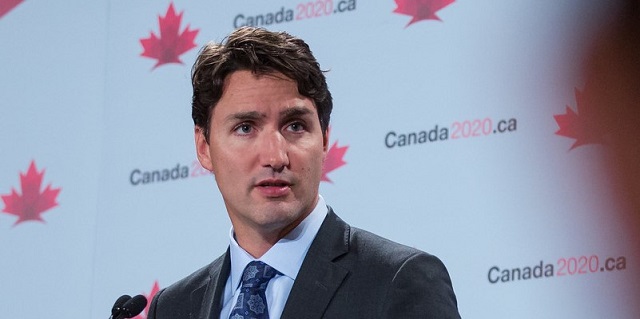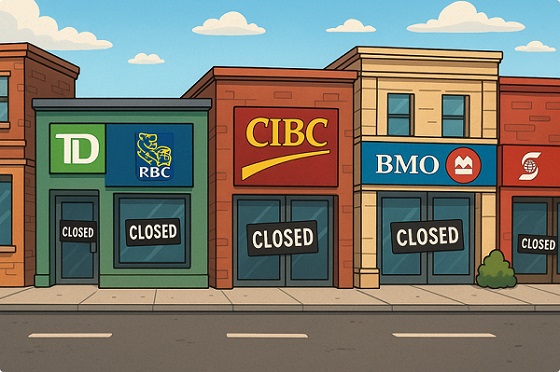Censorship Industrial Complex
Canada’s New Greenwashing Rules Could Hamper Climate Action – Grady Semmens

From Energy Now
By Grady Semmens
Also added to the mix was the ability for private citizens to lodge complaints with the Competition Bureau (starting June 20, 2025) and placing the onus on companies to prove their claims – effectively making defendants guilty of greenwashing until they can prove their information is valid.
The Government of Canada’s new rules to crack down on greenwashing will likely hamper new energy projects, including those designed to cut greenhouse gas emissions, according to experts who say they pose significant legal risk and create uncertainty for how industries across the country can communicate their plans for reaching net-zero emissions by 2050.
The legislation came into effect on June 20 as part of an omnibus package of economic policies known as Bill C-59. The package contained long-awaited tax credits for carbon capture and storage (CCS) development, sparking positive investment decisions for several new CCS projects over the summer. However, C-59 also included significant amendments to the Competition Act that require companies to more fully substantiate statements about their management of environmental and social issues – with a particular focus on claims related to climate change activity.
The crux of the concern about the anti-greenwashing laws lies in the call for companies to use an ‘internationally recognized methodology’ to report on business interests such as their decarbonization efforts. The government failed to provide guidance for what methodologies meet this standard. At the same time, massive penalties (up to three per cent of a firm’s annual gross global revenues) were introduced for companies found to be making misleading claims. Also added to the mix was the ability for private citizens to lodge complaints with the Competition Bureau (starting June 20, 2025) and placing the onus on companies to prove their claims – effectively making defendants guilty of greenwashing until they can prove their information is valid.
Response to the amendments by Canada’s energy sector was swift and dramatic. Almost immediately, the Pathways Alliance – a partnership of Canada’s largest oil sands producers that are pursuing one of the world’s largest CCS projects – gutted its website and its social media channels have gone quiet. Many energy, mining and other resource-based companies have followed suit, resulting it what some are now calling a ‘greenhushing’ that goes counter to years of admirable progress in corporate transparency and reporting on the management of environmental, social and governance (ESG) issues.
“The federal government implementing a law, without consultation, which intrinsically infringes on the ability to participate in open discussions on some of the most important issues facing the country today should be a serious concern for all Canadians,” says Lisa Baiton, president and CEO of the Canadian Association of Petroleum Producers.
Looking beyond its impact on public discourse, Baiton says the legislation also creates new roadblocks for developing critical infrastructure to help meet Canada’s climate change commitments.
“The federal government’s approach to these amendments has introduced a new level of complexity and risk for those looking to invest in Canada. The amendments to the Competition Act will make it more difficult for proponents to speak to Canadians and gain public support for their projects, particularly for those focused on reducing emissions.”
One of the country’s top environmental lawyers agrees, adding that Competition Bureau rules apply far beyond websites and sustainability reports, also encompassing the detailed plans and evidence required in regulatory applications for projects.
“Canadian regulatory processes are already protracted, and I think there will be more delays and complications for project approvals as environmental impact assessments will face an additional layer of scrutiny,” said Conor Chell, a partner and national leader of ESG legal risk and disclosure with KPMG, at a recent seminar on the impacts of C-59 on Canadian industry.
The Competition Bureau was gathering public feedback until September 27 on the new greenwashing provisions that it says will be used to provide further guidance for how the rules will be enforced. Industry players hope the consultation will result in greater clarity on what methodologies for environmental reporting the government prefers, along with details on how the bureau’s complaints tribunal will determine which complaints are in the public interest to investigate.
“Companies face a high risk of being unfairly and unnecessarily targeted and pulled into long, drawn out legal proceedings in defence of reasonable statements. Without clear guidance as to how the Competition Bureau plans to handle such frivolous and vexatious claims, this will have a chilling effect on companies’ disclosure and participation in climate and environmental policy discussions,” Baiton wrote in CAPP’s Sept. 5 feedback submission.
In the meantime, Canadian companies are figuring out how to continue reporting on their ESG performance without placing themselves at undue risk of legal action. In its latest corporate social responsibility report published earlier this month, Cenovus Energy chose to omit information on greenhouse gas emissions and other environmental subjects, while continuing to report on topics including workplace safety, engagement with Indigenous communities, and its progress on meeting equity, diversity and inclusion targets in its workforce.
“Given this uncertainty, we made the difficult decision to defer publication of information about our recent environmental performance and plans. I’d like to be very clear that this does not change our commitment to advancing our environmental work. We firmly stand by the actions we’re taking, the accuracy of our reporting and the information we’ve shared to date about our environmental performance. And, to the extent the Competition Bureau can provide clarity through specific guidance about how these changes to the Competition Act will be interpreted and applied, that will help guide our future communications about the environmental work we are doing,” Cenovus’ CEO Jon McKenzie states in his opening message to the report.
With anti-greenwashing regulations being adopted and/or strengthened in many countries, KPMG’s Conor Chell recommends companies revisit their targets and performance metrics for key environmental issues to ensure they are realistic and are backed up by accurate and consistent data.
“Canada now has some of the strongest anti-greenwashing legislation, but it is something that is growing globally, and companies will face it in other jurisdictions,” Chell said. “Going forward, as important as it will be for the good work to continue, it will be equally important to ensure that companies are thoroughly assessing and substantiating their environmental and social claims, so they can withstand the additional scrutiny that is now required.”
Grady Semmens is a writer and communications consultant specializing in energy, sustainability and ESG reporting.
Censorship Industrial Complex
Decision expected soon in case that challenges Alberta’s “safe spaces” law

The Justice Centre for Constitutional Freedoms announces that the Alberta Court of Appeal will soon release its decision in a case challenging whether speaking events can be censored on the basis of potential “psychological harm” to an audience, infringing Charter-protected freedoms of expression (section 2(b) and peaceful assembly (section 2(c).
This case stems from the University of Lethbridge’s January 30, 2023, decision to cancel a speaking event featuring Dr. Frances Widdowson, who has frequently challenged established narratives on Indigenous matters.
In written argument filed in 2024 the University claimed it cancelled the event, in part, because it had obligations under Alberta’s Occupational Health and Safety Act to ensure a workplace free of “harassment” and free of hazards to “psychological and social wellbeing.”
Lawyers argue that these provisions (which might be described as a “safe spaces” law) compel employers to censor lawful expression under threat of fines or imprisonment.
Constitutional lawyer Glenn Blackett said, “Safe spaces provisions are a serious threat to Charter freedoms. Employers who don’t censor ‘unsafe’ speech are liable to be fined or even jailed. This isn’t just the government censoring speech, it is the government requiring citizens to censor one another.”
Given the University’s defence, lawyers asked the Court of King’s Bench of Alberta to allow an amendment to the lawsuit to challenge the constitutionality of the “safe spaces” laws. However, the Court denied the request. According to the Court’s apparent reasoning because the safe spaces law is worded vaguely and generally, it is immune from constitutional challenge.
Mr. Blackett says, “I think the Court got things backwards. If legislation infringes Charter rights in a vague or general way, infringements become impossible to justify – they don’t become Constitution-proof.”
Widdowson and co-litigant Jonah Pickle appealed the ruling to the Alberta Court of Appeal, which heard argument on Monday. A decision from the Court of Appeal is expected soon.
Banks
Debanking Is Real, And It’s Coming For You

From the Frontier Centre for Public Policy
Marco Navarro-Genie warns that debanking is turning into Ottawa’s weapon of choice to silence dissent, and only the provinces can step in to protect Canadians.
Disagree with the establishment and you risk losing your bank account
What looked like a narrow, post-convoy overreach has morphed into something much broader—and far more disturbing. Debanking isn’t a policy misfire. It’s turning into a systemic method of silencing dissent—not just in Canada, but across the Western world.
Across Canada, the U.S. and the U.K., people are being cut off from basic financial services not because they’ve broken any laws, but because they hold views or support causes the establishment disfavors. When I contacted Eva Chipiuk after RBC quietly shut down her account, she confirmed what others had only whispered: this is happening to a lot of people.
This abusive form of financial blacklisting is deep, deliberate and dangerous. In the U.K., Nigel Farage, leader of Reform UK and no stranger to controversy, was debanked under the fig leaf of financial justification. Internal memos later revealed the real reason: he was deemed a reputational risk. Cue the backlash, and by 2025, the bank was forced into a settlement complete with an apology and compensation. But the message had already been sent.
That message didn’t stay confined to Britain. And let’s not pretend it’s just private institutions playing favourites. Even in Alberta—where one might hope for a little more institutional backbone—Tamara Lich was denied an appointment to open an account at ATB Financial. That’s Alberta’s own Crown bank. If you think provincial ownership protects citizens from political interference, think again.
Fortunately, not every institution has lost its nerve. Bow Valley Credit Union, a smaller but principled operation, has taken a clear stance: it won’t debank Albertans over their political views or affiliations. In an era of bureaucratic cowardice, Bow Valley is acting like a credit union should: protective of its members and refreshingly unapologetic about it.
South of the border, things are shifting. On Aug. 7, 2025, U.S. President Donald Trump signed an executive order titled “Guaranteeing Fair Banking for All Americans.” The order prohibits financial institutions from denying service based on political affiliation, religion or other lawful activity. It also instructs U.S. regulators to scrap the squishy concept of “reputational risk”—the bureaucratic smoke screen used to justify debanking—and mandates a review of past decisions. Cases involving ideological bias must now be referred to the Department of Justice.
This isn’t just paperwork. It’s a blunt declaration: access to banking is a civil right. From now on, in the U.S., politically motivated debanking comes with consequences.
Of course, it’s not perfect. Critics were quick to notice that the order conveniently omits platforms like PayPal and other payment processors—companies that have been quietly normalizing debanking for over a decade. These are the folks who love vague “acceptable use” policies and ideological red lines that shift with the political winds. Their absence from the order raises more than a few eyebrows.
And the same goes for another set of financial gatekeepers hiding in plain sight. Credit card networks like Visa, American Express and Mastercard have become powerful, unaccountable referees, denying service to individuals and organizations labelled “controversial” for reasons that often boil down to politics.
If these players aren’t explicitly reined in, banks might play by the new rules while the rest of the financial ecosystem keeps enforcing ideological conformity by other means.
If access to money is a civil right, then that right must be protected across the entire payments system—not just at your local branch.
While the U.S. is attempting to shield its citizens from ideological discrimination, there is a noticeable silence in Canada. Not a word of concern from the government benches—or the opposition. The political class is united, apparently, in its indifference.
If Ottawa won’t act, provinces must. That makes things especially urgent for Alberta and Saskatchewan. These are the provinces where dissent from Ottawa’s policies is most common—and where citizens are most likely to face politically motivated financial retaliation.
But they’re not powerless. Both provinces boast robust credit union systems. Alberta even owns ATB Financial, a Crown bank originally created to protect Albertans from central Canadian interference. But ownership without political will is just branding.
If Alberta and Saskatchewan are serious about defending civil liberties, they should act now. They can legislate protections that prohibit financial blacklisting based on political affiliation or lawful advocacy. They can require due process before any account is frozen. They can strip “reputational risk” from the rulebooks and make it clear to Ottawa: using banks to punish dissenters won’t fly here.
Because once governments—or corporations doing their bidding—can cut off your access to money for holding the wrong opinion, democracy isn’t just threatened.
It’s already broken.
Marco Navarro-Genie is vice-president of research at the Frontier Centre for Public Policy and co-author, with Barry Cooper, of Canada’s COVID: The Story of a Pandemic Moral Panic (2023).
-

 Censorship Industrial Complex2 days ago
Censorship Industrial Complex2 days agoFreedom of speech under threat on university campuses in Canada
-

 Alberta1 day ago
Alberta1 day agoOttawa’s destructive federal energy policies and Premier Danielle Smith’s three part solution
-

 Business2 days ago
Business2 days agoCarney engaging in Orwellian doublethink with federal budget rhetoric
-

 Alberta2 days ago
Alberta2 days agoIs Alberta getting ripped off by Ottawa? The numbers say yes
-

 Energy2 days ago
Energy2 days agoCanada’s LNG breakthrough must be just the beginning
-

 Business2 days ago
Business2 days agoCourt’s ‘Aboriginal title’ ruling further damages B.C.’s investment climate
-

 Agriculture1 day ago
Agriculture1 day agoIn the USA, Food Trumps Green Energy, Wind And Solar
-

 Business2 days ago
Business2 days agoManitoba Must Act Now To Develop Its Northern Ports



